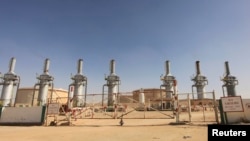AJDABIYA/TRIPOLI —
A movement pushing for greater autonomy in eastern Libya said on Sunday it would not end the blockade of several oil-exporting ports, dashing hopes of a resolution to a three-month standoff with the Tripoli government.
The announcement was a blow to Prime Minister Ali Zeidan who had said he expected the blockade to end on Sunday after almost two weeks of negotiations with eastern tribal leaders to free up the vital trade.
Western powers worry Libya will slide into chaos as the Tripoli government struggles to rein in militias and tribesmen who helped topple Moammar Gadhafi in 2011 but kept their weapons and control parts of the OPEC-member country.
The port blockades, along with strikes by oil workers, civil servants, tribesmen and other protesters at oilfields across the desert country, have cut vital oil exports to 110,000 barrels per day from more than 1 million in July.
On Tuesday, the eastern autonomy group said it would release three ports - which had previously handled 600,000 barrels of oil exports a day - if Tripoli let it take a share of oil sales and investigated reports of corruption in the industry.
“We have failed to reach a deal on these conditions with this [Tripoli] government,” autonomy leader Ibrahim Jathran told reporters at his group's home base in Ajdabiya, west of Benghazi.
“I therefore confirm that we will not reopen the ports for this corrupt government,” he said in brief statement.
Jathran said Zeidan's government had let down Libyans after the revolt that ended four decades of Gadhafi rule.
“We want a decent life, rights, security, an army, police and security forces which protect citizens,” said Jathran, who was a rebel commander during the NATO-backed uprising.
Jathran used to head a force protecting oil installations until he defected with his heavily armed men in the summer and seized the Ras Lanuf, Es-Sider and Zueitina ports to boost his campaign for more regional autonomy and a greater share of oil sales.
The oil blockades have dried up the main source for the dollars needed to import wheat and other basic foodstuffs. The government has warned it will not be able to pay public sector workers if oil strikes continue.
Oil officials said on Sunday Libya was increasing fuel imports to ease shortages gasoline stations.
There was no immediate comment from Tripoli on Jathran's statement. Deputy Oil Minister Omar Shakmak declined to comment when asked by reporters at a news conference on fuel imports.
Officials have refused to recognize the self-declared eastern government and warned that Tripoli would attack any tanker trying to load oil at seized ports.
Jathran selling oil?
Zeidan and other officials had expressed confidence that Jathran would be persuaded to lift the port blockades, which raised hopes on international markets that three months of oil strikes would end.
Jathran, who is in his early 30s, is popular among many in the east demanding a political system to share power and the oil wealth equally between the eastern Cyrenaica, the west and the southern Fezzan, as was the case in the pre-Gadhafi era.
Many also agree with Jathran that the central government has failed to provide security. In Benghazi, the east's main city, gunmen killed an army officer on Sunday, a security source said, the latest in a series of assassinations. Three soldiers were also wounded by a bomb, the source added.
Tribal leaders have put pressure on Jathran to end his port action because many ordinary Libyans are tired of power cuts and fuel shortages.
Richard Mallinson, geopolitical analyst at Energy Aspects consultancy in London, said Jathran felt confident enough to rely on his forces' strength but he risked splitting the tribesmen and militias in the east.
“Struggles within power bases in the east could become significant,” he said.
Jathran did not repeat an earlier threat to start selling crude, bypassing Tripoli. When asked later by Reuters whether he would go ahead exporting oil from seized ports, he said this was up to his self-declared government.
“We gave them (the government) all powers to do its job,” he said, without elaborating.
Zeidan has been trying to get the ports reopened but has been weakened by political conflicts with parliament and Islamist opponents.
The government also has to deal with a mix of different protesters. A separate set of tribal leaders has blocked Hariga port in the far east. Members of the Amazigh and Tibu, two minority groups, have also blocked gas or oil supplies in the past.
The announcement was a blow to Prime Minister Ali Zeidan who had said he expected the blockade to end on Sunday after almost two weeks of negotiations with eastern tribal leaders to free up the vital trade.
Western powers worry Libya will slide into chaos as the Tripoli government struggles to rein in militias and tribesmen who helped topple Moammar Gadhafi in 2011 but kept their weapons and control parts of the OPEC-member country.
The port blockades, along with strikes by oil workers, civil servants, tribesmen and other protesters at oilfields across the desert country, have cut vital oil exports to 110,000 barrels per day from more than 1 million in July.
On Tuesday, the eastern autonomy group said it would release three ports - which had previously handled 600,000 barrels of oil exports a day - if Tripoli let it take a share of oil sales and investigated reports of corruption in the industry.
“We have failed to reach a deal on these conditions with this [Tripoli] government,” autonomy leader Ibrahim Jathran told reporters at his group's home base in Ajdabiya, west of Benghazi.
“I therefore confirm that we will not reopen the ports for this corrupt government,” he said in brief statement.
Jathran said Zeidan's government had let down Libyans after the revolt that ended four decades of Gadhafi rule.
“We want a decent life, rights, security, an army, police and security forces which protect citizens,” said Jathran, who was a rebel commander during the NATO-backed uprising.
Jathran used to head a force protecting oil installations until he defected with his heavily armed men in the summer and seized the Ras Lanuf, Es-Sider and Zueitina ports to boost his campaign for more regional autonomy and a greater share of oil sales.
The oil blockades have dried up the main source for the dollars needed to import wheat and other basic foodstuffs. The government has warned it will not be able to pay public sector workers if oil strikes continue.
Oil officials said on Sunday Libya was increasing fuel imports to ease shortages gasoline stations.
There was no immediate comment from Tripoli on Jathran's statement. Deputy Oil Minister Omar Shakmak declined to comment when asked by reporters at a news conference on fuel imports.
Officials have refused to recognize the self-declared eastern government and warned that Tripoli would attack any tanker trying to load oil at seized ports.
Jathran selling oil?
Zeidan and other officials had expressed confidence that Jathran would be persuaded to lift the port blockades, which raised hopes on international markets that three months of oil strikes would end.
Jathran, who is in his early 30s, is popular among many in the east demanding a political system to share power and the oil wealth equally between the eastern Cyrenaica, the west and the southern Fezzan, as was the case in the pre-Gadhafi era.
Many also agree with Jathran that the central government has failed to provide security. In Benghazi, the east's main city, gunmen killed an army officer on Sunday, a security source said, the latest in a series of assassinations. Three soldiers were also wounded by a bomb, the source added.
Tribal leaders have put pressure on Jathran to end his port action because many ordinary Libyans are tired of power cuts and fuel shortages.
Richard Mallinson, geopolitical analyst at Energy Aspects consultancy in London, said Jathran felt confident enough to rely on his forces' strength but he risked splitting the tribesmen and militias in the east.
“Struggles within power bases in the east could become significant,” he said.
Jathran did not repeat an earlier threat to start selling crude, bypassing Tripoli. When asked later by Reuters whether he would go ahead exporting oil from seized ports, he said this was up to his self-declared government.
“We gave them (the government) all powers to do its job,” he said, without elaborating.
Zeidan has been trying to get the ports reopened but has been weakened by political conflicts with parliament and Islamist opponents.
The government also has to deal with a mix of different protesters. A separate set of tribal leaders has blocked Hariga port in the far east. Members of the Amazigh and Tibu, two minority groups, have also blocked gas or oil supplies in the past.






